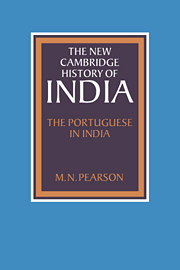2 - The system in operation
Published online by Cambridge University Press: 28 March 2008
Summary
A brief analysis of the Portuguese success in monopolizing the trade in spices will begin our discussion of this system, and of Indian responses to it. It will be followed by discussions of Portuguese policies and Indian reactions concerning the horse trade, general trade control, and technology. These case studies will reveal several problems for the Portuguese: their need to take into account local pressures; problems with their own system in practice; regional variations; and changes over time during the sixteenth century. This whole discussion of ‘reactions’ to the Portuguese ‘impact’ should indeed call into question the very validity of these terms, for the implications, of a dynamic west impacting on a static east, are clearly incorrect.
There is now a considerable body of writing on the spice trade of the sixteenth century, focussing on the trade to Europe. The first point to make clear is that this was in fact a rather minor part of the total Asian trade in spices. In 1500 Europe took, at the most, one quarter of total Asian production of spices. The greatest consumer of pepper was China, which took perhaps three quarters of total Southeast Asian production. Over the sixteenth century Europe's share rose considerably, as her consumption increased thanks to comparatively lower prices. The result was that Asian production of spices during the sixteenth century may have doubled to meet this increasing demand not only in Europe but in Asia also.
- Type
- Chapter
- Information
- The Portuguese in India , pp. 40 - 60Publisher: Cambridge University PressPrint publication year: 1988

